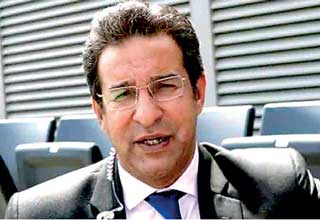Monday Feb 23, 2026
Monday Feb 23, 2026
Monday, 31 October 2022 00:00 - - {{hitsCtrl.values.hits}}
 |
| Wasim Akram
|
LONDON, AFP: Pakistani cricket legend Wasim Akram says it took the death of his first wife Huma to spark him into finally kicking his addiction to cocaine which had replaced the thrill of playing when he retired.
The 56-year-old former pace bowler and a key member of the Pakistan side that won the 1992 World Cup told the Sunday Times it was Huma who “found me out” and advised him to seek help.
However, that did not work, Akram said an interview to promote his new autobiography “Sultan: A Memoir”, because “the doctor was a complete con man” and he returned to taking cocaine.
It took Huma’s death aged just 42 in October 2009 to finally persuade him to give it up.
Akram – who took over 400 wickets in 104 Tests – said “the culture of fame in south Asia is all-consuming, seductive and corrupting” and he fell into that trap after he retired in 2003.
“It was a substitute for the adrenaline rush of competition, which I sorely missed, or to take advantage of the opportunity, which I had never had.
“My devices turned into vices.” Akram – who was diagnosed with diabetes when he was 30 – said he first took cocaine when he was offered some at a party in England.
“My use grew steadily more serious, to the point that I felt I needed it to function,” he said.
Huma lived between England and Lahore with their two sons, Tahmoor and Akbar, but felt isolated as Akram’s media commitments took him all over the world.
“It (cocaine) made me volatile,” he said.
“It made me deceptive. Huma, I know, was often lonely in this time… she would talk of her desire to move to Karachi, to be nearer her parents and siblings.
“I was reluctant. Why? Partly because I liked going to Karachi on my own, pretending it was work when it was actually about partying, often for days at a time.” Akram agreed with Huma he needed help after her “discovering a packet of cocaine in my wallet.” “I couldn’t control it,” he said. “Four (lines) would become a gram, a gram would become two.
“I could not sleep. I could not eat. I grew inattentive to my diabetes, which caused me headaches and mood swings.” Akram said rehab in Lahore proved a total failure, not least because the doctor placed dollar signs ahead of curing his patients.
“This facility was brutal: a bare building with five cells, a meeting room and a kitchen,” he said.
“The doctor was a complete con man, who worked primarily on manipulating families rather than treating patients, on separating relatives from money rather than users from drugs.” Far from cured, he resumed his habit as “the lure of my lifestyle remained” and indulged in it at the 2009 Champions Trophy.
However, it was to be the final rush as two weeks after the tournament finished Huma died of mucormycosis, a rare fungal infection. The tragedy finally convinced Akram to give up cocaine.
“Huma’s last selfless, unconscious act was curing me of my drug problem,” said Akram, who has since remarried Australian Shaniera Thompson with whom he has had a daughter Aiyla.
“That way of life was over, and I have never looked back.”